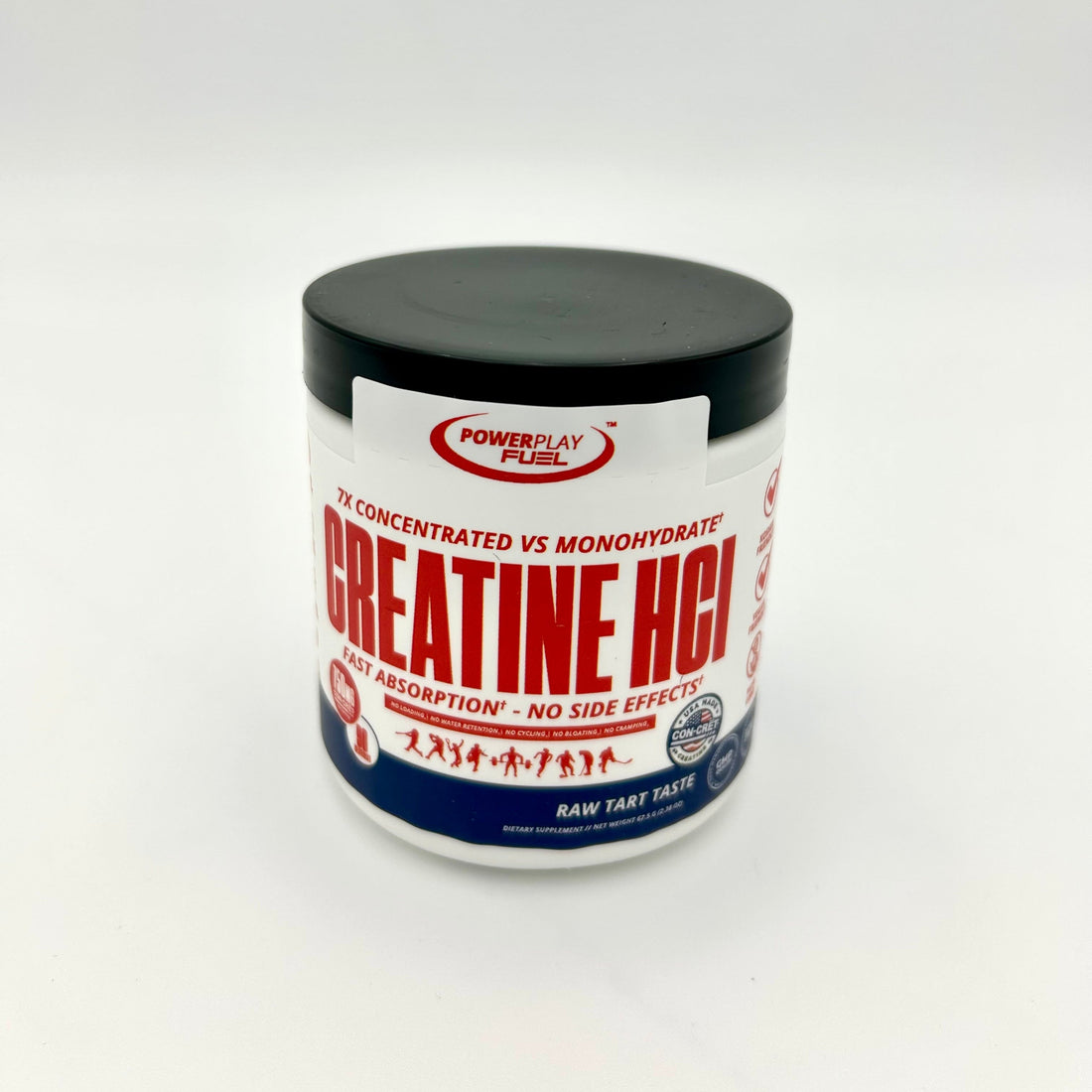
Which is better, creatine HCl or monohydrate?
Share
Creatine supplements are a top choice for athletes looking to improve their performance and body shape. As more people seek the best creatine, it's important to compare the benefits of Creatine HCl and Creatine Monohydrate. Both are known for helping with muscle growth, strength, and recovery.
Each type has its own special features, like how they're made, how well they're absorbed, and how they affect muscle water levels. This article will explore the science behind these supplements. We'll figure out which one is better for muscle enhancement.
When choosing between Creatine HCl and Monohydrate, it's important to think about your own health goals and what might happen to your body. Looking at scientific studies and expert advice can help you pick the right creatine for you.
Key Takeaways
- Creatine supplements are key for boosting muscle strength and recovery.
- Creatine HCl and Monohydrate are the top choices for the best creatine supplement.
- Understanding absorption rates and solubility is key to knowing the benefits of creatine.
- Think about your health goals and possible side effects when picking a creatine type.
- Scientific research and expert opinions help find the best creatine for you.
Understanding Creatine: HCl vs. Monohydrate
Many athletes and fitness fans use creatine supplements to boost their performance and grow muscles faster. But, not all creatine is the same. Knowing the differences between Creatine HCl and Monohydrate can help you get better results. We'll look at how they help with muscle growth, ATP replenishment, and overall fitness.
What is Creatine and Its Important Role in Muscle Energy
Creatine is a key amino acid in muscles, helping make ATP, the main energy source in cells. This energy is vital for intense workouts, boosting strength, growing muscles, and quick recovery. The body makes creatine from amino acids, but supplements can help reach the best levels for muscle growth and energy.
The Distinct Forms: Creatine HCl and Monohydrate Explained
- Creatine Monohydrate: This form is well-studied and pairs creatine with water. It increases muscle size and strength quickly.
- Creatine HCl: It's known for better solubility thanks to hydrochloride. You need less of it and don't need a loading phase, which is good for those who can't handle big doses.
How Creatine HCl and Monohydrate Differ in Solubility and Absorption
The main difference between Creatine HCl and Monohydrate is in solubility and absorption. Creatine HCl is more soluble, which might mean better absorption and effectiveness, even with smaller doses. On the other hand, Creatine Monohydrate needs bigger doses and a loading phase but has shown long-term muscle growth benefits. Knowing these differences helps tailor your supplement plan to your specific needs and workout style.
Which is Better, Creatine HCl or Monohydrate?
Choosing between creatine HCl and monohydrate depends on what you need and like. Creatine monohydrate strengths come from lots of scientific studies. It's known for making muscles stronger and bigger.
Creatine Monohydrate has been trusted for decades to improve performance. It's reliable and works well.
The creatine HCl benefits include better solubility and faster absorption. This means you might see results quicker with less to take. Plus, it's gentler on your stomach than monohydrate, which is great for those who get upset stomachs from supplements.
- Monohydrate is cheaper, so more people can use it.
- HCl might be better for those who want easy use and fewer side effects.
Both types can help build muscle and boost strength. So, it really comes down to what you prefer and how your body reacts to each.
Pros and Cons: Creatine HCl versus Monohydrate
Looking into Creatine HCl and Monohydrate shows their good and bad sides. Each has its own benefits for those who work out and want to get stronger. They meet different needs and tastes.
Advantages of Creatine Monohydrate
The main creatine monohydrate benefits come from lots of studies proving it boosts muscle strength. It helps muscles grow and recover faster. This makes creatine monohydrate a top choice for long-term use.
Understanding the Benefits of Creatine HCl
Creatine HCl is known for its creatine HCl performance. It's more soluble, which is a big plus. People say it causes less creatine gastrointestinal side effects and reduced bloating than monohydrate. It's good for those who easily get upset stomachs.
Comparative Analysis on Water Retention and Gastrointestinal Effects
When comparing, creatine HCl seems to solve the creatine water retention problem of monohydrate. Its special formula cuts down on water retention. This means less weight and bloating for users.
Evaluating the Cost-Effectiveness for Consumers
Looking at the creatine cost comparison, monohydrate is cheaper. But, Creatine HCl might be worth it for those who want fewer side effects and better results. Even though it costs more, you might need less of it, making it a good deal in the long run.
Conclusion
The debate on which is better, creatine HCl or monohydrate comes down to personal choices and goals. Creatine Monohydrate is known for its long history and value, making it a favorite among creatine supplements. It has helped many athletes and fitness lovers achieve their goals.
Creatine HCl is also popular for its easy solubility and lower dosage needs. It's seen as a gentler option for those with sensitive stomachs. Even though it costs more, its benefits like less bloating are worth it to some. Having many creatine types to choose from lets people pick what works best for them.
Choosing between creatine HCl or monohydrate isn't a one-size-fits-all decision. It depends on how you react to supplements, your budget, and your diet. But, creatine is key for anyone looking to improve their physical performance and build muscle.
At Power Play Fuel, we have both in stock and ready to ship to you. You can buy it directly on our website or find it on Amazon.com
FAQ
What is Creatine and Its Important Role in Muscle Energy?
Creatine is a natural amino acid that boosts muscle energy. It helps refill ATP, the cell's main energy source, for intense workouts. Taking creatine supplements can increase muscle strength, boost energy, and aid in recovery after exercise.
What Are the Distinct Forms of Creatine Supplementation?
There are two main types of creatine supplements: Creatine HCl and Creatine Monohydrate. Monohydrate is creatine with a water molecule, while HCl is creatine with hydrochloride. This affects their solubility, absorption, and other properties.
How Do Creatine HCl and Monohydrate Differ in Solubility and Absorption?
Creatine HCl dissolves better in water, possibly leading to better body absorption and smaller doses. Monohydrate, though less soluble, has been widely studied and proven effective in muscle growth and strength.
What Are the Advantages of Creatine Monohydrate?
Creatine Monohydrate has a strong scientific backing. It boosts muscle strength, endurance, and protein synthesis. It's also affordable and widely available, making it a favorite among many.
What Are the Benefits of Creatine HCl?
Creatine HCl is known for its high water solubility, suggesting better absorption and smaller doses. It may also cause less water retention and bloating, which is beneficial for those with stomach issues.
Do Creatine HCl and Monohydrate Have Different Effects on Water Retention and Gastrointestinal Effects?
Yes, they do. Creatine HCl is believed to cause less water retention and bloating than Monohydrate. This makes HCl a better choice for those with sensitive stomachs or who dislike the bloated feeling from Monohydrate.
How Does the Cost-Effectiveness of Creatine HCl Compare to Monohydrate?
Creatine Monohydrate is cheaper, with a lower cost per serving. This is important for those on a tight budget. Creatine HCl, despite needing smaller servings, is pricier but may be seen as more potent due to its solubility.
